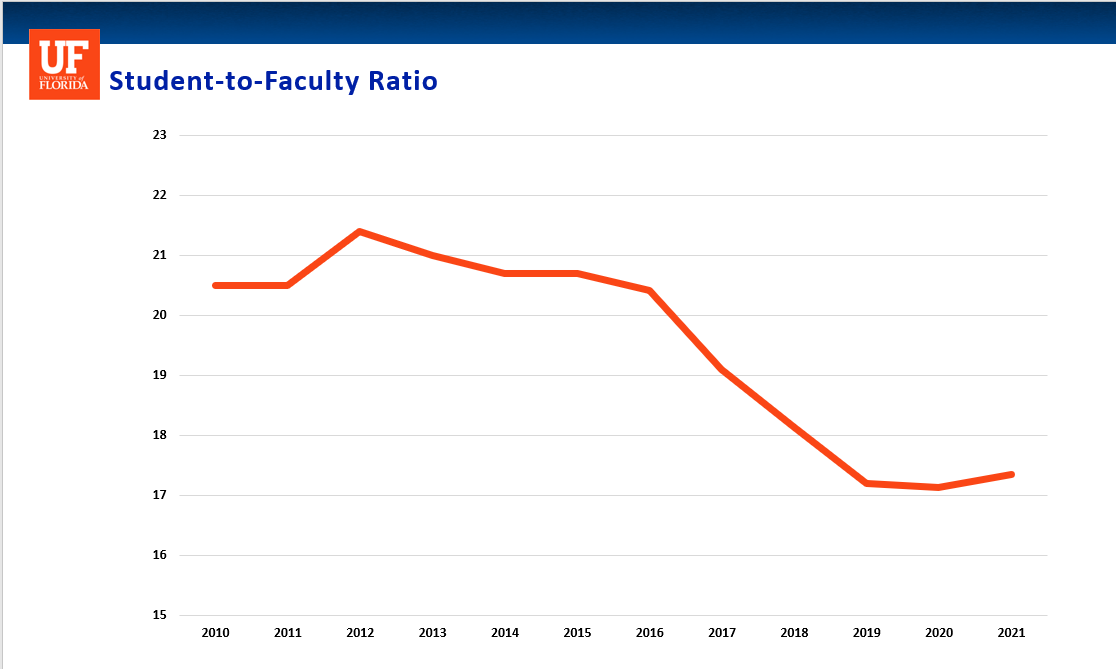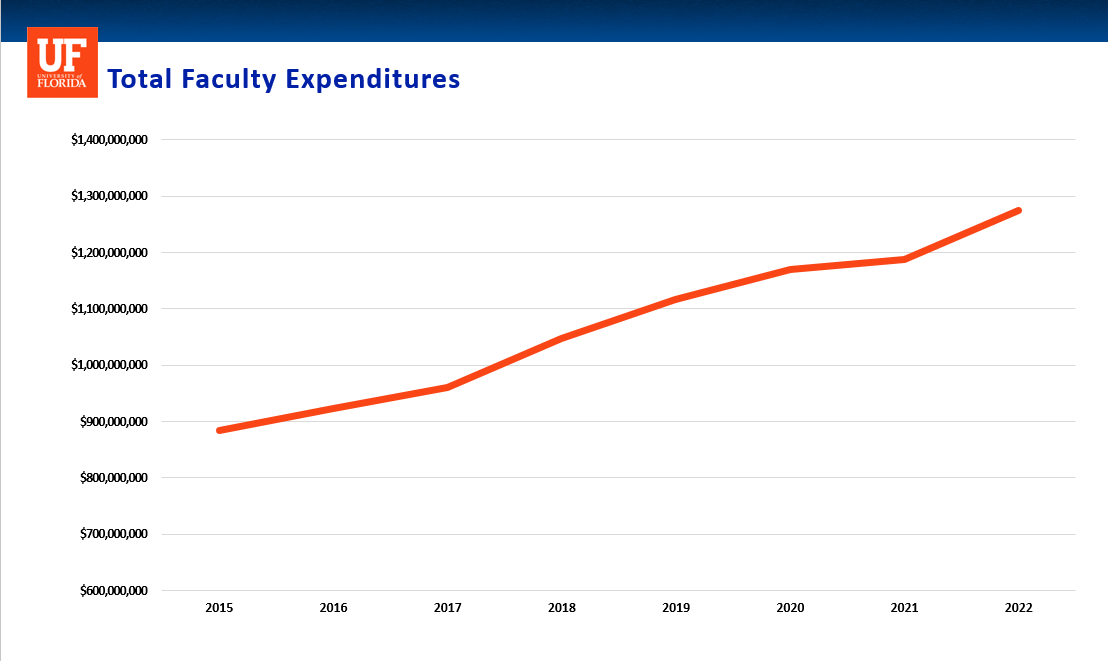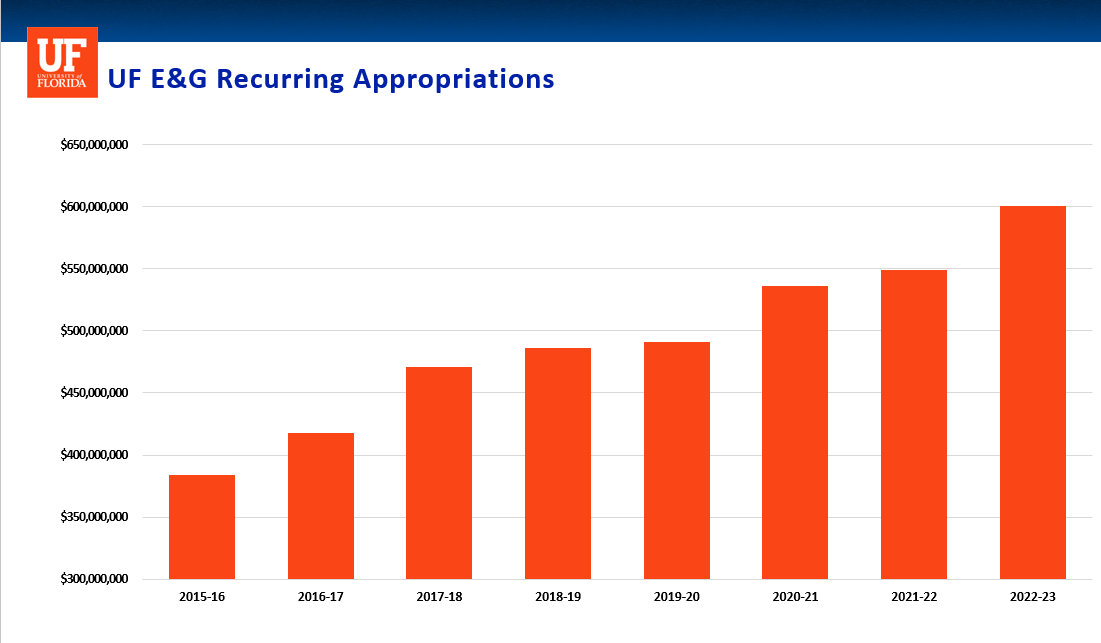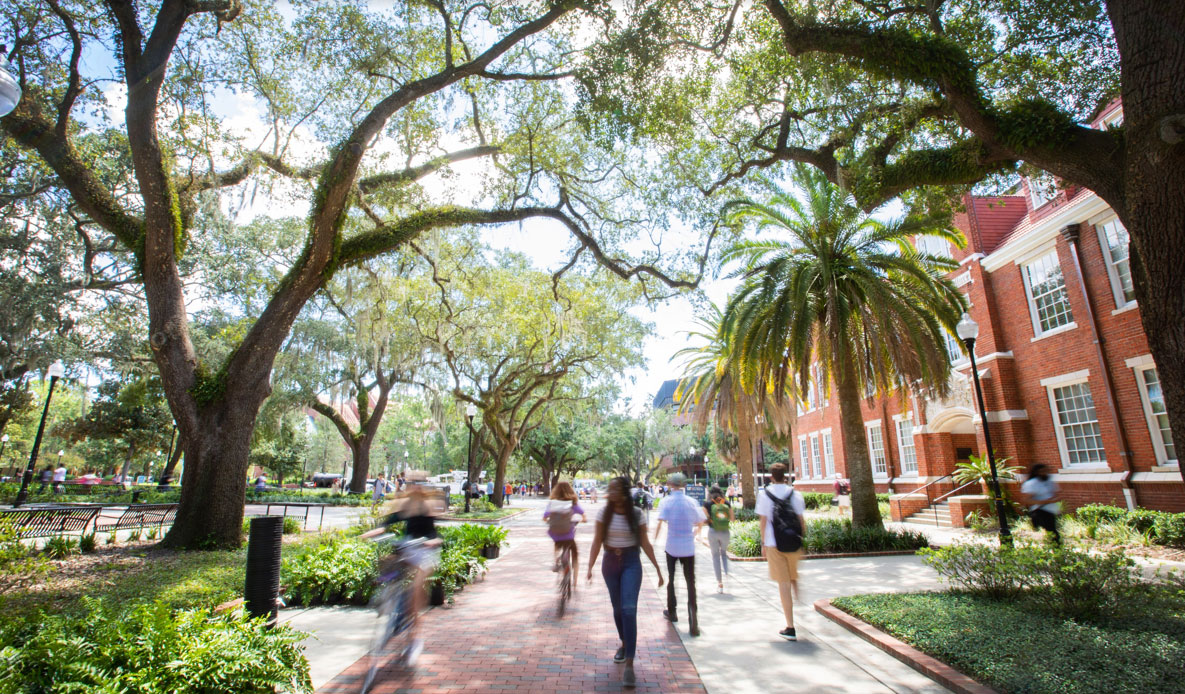State of the University: Mori Hosseini
Thank you, Dr. Phalin, for the invitation today and for the commitment to the university that you’ve already shown during your first months as a member of the Board of Trustees.
First, I can’t talk about the stature of this great university without acknowledging the transformational leadership of President Fuchs. I was Chair of the Board of Governors when the UF search committee was considering the provost from Cornell to be the 12th president of this place. I didn’t know Kent and had no idea what to expect.
During our initial meeting, I asked Kent whether he would commit to helping the University of Florida earn its rightful spot among the top 10 public universities in America. Kent said that not only would he absolutely commit to getting Florida’s flagship university into the top 10, he believed that top 5 was possible.
It turns out he was right, but that’s just one of many places where President Fuchs’ vision and leadership have created a home where students, faculty, and the rest of the university community can thrive.
I expect that there will be plenty of opportunities to celebrate Kent and his leadership over the coming months, so I won’t go on as long as I could about my friend.
But, of course, Kent is returning to the classroom after eight years of leadership of UF and I imagine that you’re interested in how the search is going for the 13th president of this great university. I’ll talk about that in a few minutes.
Before that I want to extend a heartfelt thank you to our faculty from me personally, and on behalf of our Board of Trustees and the entire university community. The work you do is nothing short of phenomenal, and you have the awards and recognitions to prove it.
This year alone, nine UF faculty members were named recipients of the National Science Foundation’s Early Career Development Awards – a record number from UF. One was named to the National Academy of Engineering and another to the National Academy of Sciences, bringing the total number of National Academies members at UF to 34. And one is a winner of both the Latin Grammy and the Emmy.
I could go on, but my point is to tell you how grateful we on the Board of Trustees are for your remarkable accomplishments. Not only do they speak volumes about what an impressive institution the University of Florida is, but, more important, they speak to the high quality of education that our students receive from you.
I also want to say thank you for your extraordinary service during the pandemic. While we sometimes had differences of opinion about how to handle things, our faculty saw to it that our students had the best learning opportunities possible while achieving an incredible milestone of more than $1 billion in research expenditures.
Thank you.
So now let’s talk about the Board of Trustees’ priorities over the past several years and the next few.
One of the lessons I’ve learned in my private business is that if you take good care of your employees, your customers will get well taken care of. We’re trying to bring that same approach to the University of Florida, but I have to admit that we had to start from a significant hole.
You heard President Fuchs report that we have added more than 1,000 faculty positions since he arrived at UF in 2015. But that tells only part of the story.
In the early part of the last decade, our student-to-faculty ratio became unacceptably high. That not only increased the load on our faculty, it was not the best way to prepare students or serve the many others who depend on us.

You’ll see in this chart that as late as Fall 2016, UF’s student-to-faculty ratio was hovering around 21-to-1. We went to the legislature for help and they gave us money to create 500 new faculty positions, plus another 100 focused on AI.
You see the impact of those new positions on this chart, and hopefully in your classrooms. As of our last measurement in Fall of 2021, our student-to-faculty ratio has improved to 17-to-1, even though our student enrollment has actually increased. Our ultimate goal is to get to 16-to-1.
In addition to a student-to-faculty ratio that needed to be improved, the administration had not been able to consistently offer raises to recognize our people and your hard work.
When I first arrived at UF, President Fuchs told me that he was concerned that there was no money for faculty raises, so he would not take the raise that his contract guaranteed him. That was not what should happen at a top university, and the Board of Trustees committed that the future would be different. Taking better care of our faculty had to be a top priority.
So we have made our faculty our top priority when we advocate in the legislature since I joined the Board of Trustees, and I feel good about the progress we’re making.

If we look back over the last six years, the University of Florida has grown our faculty payroll by more than one-third. In fiscal year 2016, our faculty payroll was $923 million dollars. In the fiscal year that just ended, our faculty payroll was $1.27 billion, and I expect that this year’s spending will be higher still.
I want to take a moment to pause on this, because it is so important to me and is one of the things that I am proudest of. We are spending $300 million dollars more on faculty compensation today than we were just six years ago. That is an amazing increase, and I am not aware of any other university in the country that has made that kind of progress in how we compensate the people who teach our students and lead world-changing research.
Of course, we could not have done this without sustained support from Florida’s legislature and governor.

You’ll see on this chart that during the period that UF increased our faculty payroll by more than $300 million, the Florida legislature increased UF’s base recurring appropriations by $217 million, from just over $383 million in fiscal year 2016, to just over $600 million in the fiscal year that just began.
And as grateful as we are for that recurring operating support, the legislature and governor have appropriated another $639 million over that same time period for us to improve the buildings and infrastructure on our campus. In fact, this spring’s legislative session brought an unprecedented $148 million appropriation for us to deal with deferred maintenance projects across UF.
Again, I am not aware of any other state where policymakers have made the kind of sustained investment in higher education that we have seen in Florida. I believe that’s happening because we are focused on the success of our students, making bold promises, and consistently keeping those promises.

Going back to compensation for a moment - While I do feel some sense of satisfaction that there was money to give you raises in prior years when other state employees – and other universities – did not receive raises, I wish that the legislature would have included the universities in the pay increases that they provided for other state employees this past session.
I know that inflation is real and has a real impact. I’m glad that we were able to provide some additional help for our lowest paid employees this summer, but I’m disappointed that we did not receive the resources to provide raises for the rest of the staff and faculty more than the 3% overall that we can fund ourselves.
I am committed to working with the Board of Governors and the rest of the State University System to try to find ways to secure more funding for compensation in future years. That includes working to make retirement contributions more competitive. I know that those retirement contributions have been a source of concern for the faculty, and they are for me too. We have to take care of our faculty and staff so that you all can take care of our students.
More to come on all of that.
While I’m here today to talk mostly about faculty issues, I can’t miss the opportunity to say a little bit about our students. I won’t repeat what President Fuchs just said about the amazing qualities and qualifications of the students who are attracted to the University of Florida.
Instead, I’d like to touch on an issue that is near and dear to my heart and to the heart of our Board of Trustees – and that’s about improving access to this university. We are committed to ensuring a world-class education is within reach for all academically qualified students.
While we still have work to do, I am pleased to report that this year UF has increased the number of low-income first-time-in-college students by 9% over last year.
In addition to targeted outreach, we know of course that affordability remains a barrier for many low-income students. To help remove the barrier, I worked closely with our Provost to develop the new UF Excellence Grant.
The Excellence Grants recognize first-time-in-college, high-achieving students and offer them a path to graduate debt-free. This four-year program meets all of a student’s financial need with a combination of scholarships, grants, and work-study.
We backed that up by finding $5 million a year to set aside for each of the next four years to see if that support, combined with expanded strategies and tactics to increase our applications, admits, and enrolled low-income students can make a sustained difference for lower-income students.
An education and a degree from the University of Florida is a life-changing experience. More academically qualified students should be able to access that opportunity.
Also, President Fuchs gave a nice overview of all of the construction happening on our campus and I won’t repeat that here. What I will say, though, is that the Board of Trustees plans to invest and continue this work. Our students, our faculty, our staff, and our visitors deserve a Top 5 university experience at our UF facilities all across the state. Unfortunately, that is not where we are today.
For decades, the basic infrastructure needs of our university have been neglected or kicked down the road for another day. We cannot do that any longer.
You’ve seen us work on transformative new spaces like Malachowsky Hall for Data Science and Information Technology and the Honors Village residential community. You’ve also seen us work on more mundane things like fixing leaky steam pipes and underground infrastructure. As part of that, work will soon start on a roughly $500 million project to replace the failing system that provides our campus with steam and chilled water.
It is hard work, expensive work, and often disruptive work, but we believe that you deserve it. I am grateful to the staff and faculty who are working on these projects – and all of the other initiatives I’ve mentioned – and I am also grateful to everyone on campus for your patience, as we work together to build a better, safer, more sustainable campus for the decades ahead.
Now, I’d like to give you a brief update on the progress of the presidential search. As you probably know, the search committee met this past spring to conduct listening sessions with the campus community and develop a list of qualifications and criteria we wish to see in our next president.
During those listening sessions, several members of the campus community expressed their opinions about the qualities they’d like to see in our next president. The search committee and the Board of Trustees listened: you have no doubt seen those desires highlighted if you’ve visited the President Search webpages.
The search committee, working with the search firm, is now in the process of recruiting and engaging with potential candidates with a goal of selecting semi-finalists and conducting candidate interviews, including campus visits, in October.
I can tell you there has been a great deal of interest in this position, and I am confident we will be successful in finding the very best, most qualified person to lead this great university to its next amazing achievements.
Thank you for inviting me today, Dr. Phalin, and thank you, Senators, for all you do. I agree with President Fuchs that the best years for the University of Florida lie ahead of us. Together, we can help lift this great university to heights never before seen or imagined and, in turn, help do the same for our state and our nation .
Dr. Wright – I believe you have some questions to ask me in the few minutes we have remaining. I’m sorry that I can’t get to all of the questions today, but I want to hear Dr. Phalin’s presentation before I have to head back out of town.
